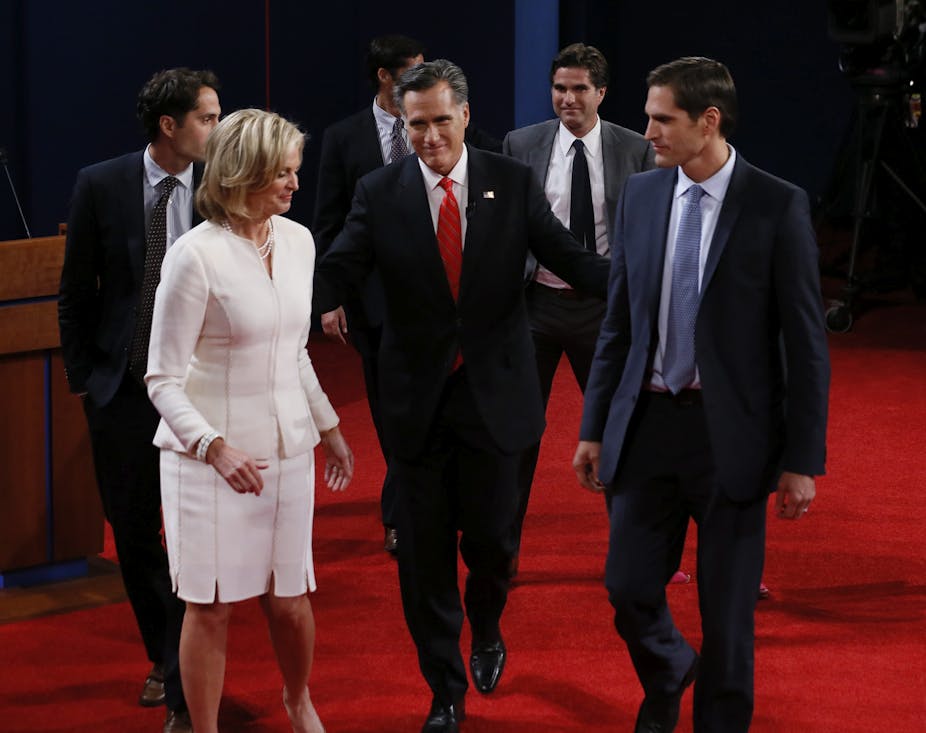Mitt Romney’s victory in the first presidential debate has given his campaign a much-needed lift with four weeks remaining until the election.
But can the strength of Romney’s debate performance really change the dynamics of the race that have seen him lagging badly in recent opinion polls in key states?
The bookmakers’ odds on Romney’s chances are again instructive in seeing where his candidacy currently sits. Before the debate Ladbrokes had President Obama as short as 1/7 to win the Presidency while Romney’s chances were rated at 9/2. Since the debate, Romney’s odds of winning have shortened to 5/2 while the President is still rated at 2/7. Clearly as far as the bookmakers are concerned, Romney still has a lot of ground to make up.
Mitt Romney’s debate performance did, however, highlight what he needs to do to win the election. The success of his performance rested significantly on his ability to change the conversation about what matters in the election. Aided by the unfortunate comment by Vice President Joe Biden that “the middle class has been buried” over the past four years, Romney hammered away at President Obama’s economic record. In particular, he stressed what he regarded as the crippling size of the United States deficit, incorrectly asserting that this deficit has doubled during the Obama presidency. The more relaxed and on occasion humorous manner, which he adopted in his delivery, also helped in the selling of his message that he was not out to cut taxes for the rich and disadvantage those who were struggling in the middle class.
One example that Romney used that particularly hit home with an audience concerned about the size of government was his comment about scrutinising all government programs to see whether they justified borrowing money from China in order to finance them. This comment tapped strongly into American fears about the loss of sovereignty to another not particularly friendly Asian nation. It also tied in well with a further Romney comment about the deficit being a great moral issue that mortgaged future generations. In a debate marked by a lack of one-liners and pithy comments these two statements worked for Romney both in changing the conversation to be about the deficit as well as humanising the candidate to make what he said sound believable.

In contrast, as many commentators have said, President Obama seemed more professorial than presidential. In the race so far he has been particularly successful, aided by the gaffes from the Romney campaign, in painting the challenger as a rich and heartless businessman out to help his corporate mates rather than the American middle class. Given this fact it seemed inexplicable that the President did not attack Mitt Romney’s public comments and persona more strongly.
Whereas Romney used the Biden comment to good effect, President Obama failed to tag Romney with his comment about the 47% of Americans who were apparently too lazy to work and thus pay income tax. Given the significance for Obama of his oft-repeated remarks in the debate that Romney would cut taxes for the rich whilst increasing them for the middle class, an example to show that Romney was out of touch with the struggles of ordinary Americans at a time of crisis would have clearly strengthened his case.
How is all this likely to play out in November? If we look at history then Romney still has a big mountain to climb. As Nate Cohn wrote in the New Republic before the debate, no presidential candidate since 1948 has come back from being clearly behind in the polls in September to win in November.
Having said that, clearly the Romney campaign will gain some advantages from the debate. The boost in campaign coffers that Nicholas Confessore in the New York Times noted as $12 million online in 48 hours after the debate will aid the morale as well as the finances of the campaign.
It also puts significant pressure on President Obama to perform better in the final two debates to avoid the impression that the presidential aura is slipping from his grasp. The advantage he has in the final debates is that foreign policy constitutes half of the second debate and the complete third debate. This area, which is normally a strength for the Republicans, is one where the Washington Post and other polls have the President as clearly leading the challenger in terms of the public’s confidence in him handling the issue.
On balance then, while Mitt Romney has certainly enjoyed a lift from his first debate performance President Obama is still likely in my view to retain office in November.

